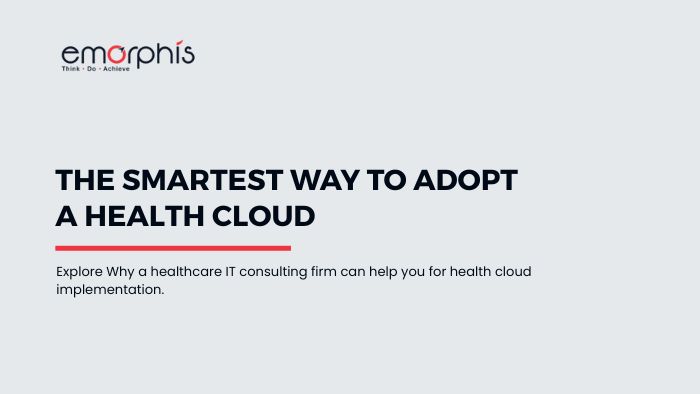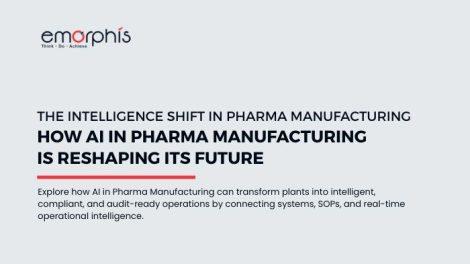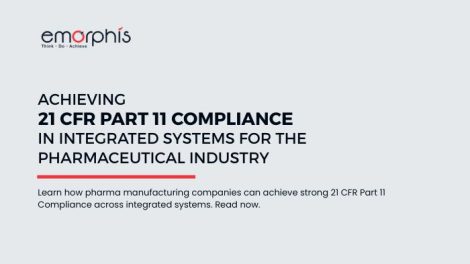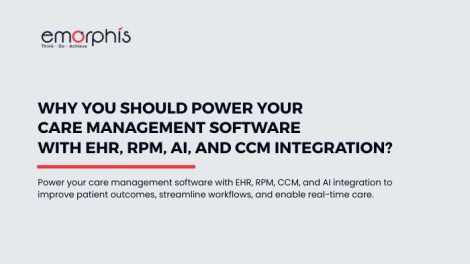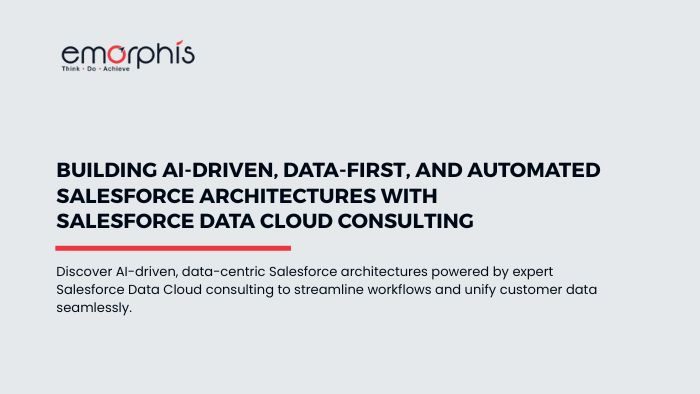About Emorphis, a Healthcare IT Consulting Firm
Emorphis is a leading healthcare IT consulting firm that helps healthcare organizations modernize their systems and adopt cloud technologies. With expertise in digital transformation, Emorphis assists hospitals, clinics, and healthcare providers in implementing technology solutions that improve patient care, operational efficiency, and compliance with healthcare regulations.
Emorphis ensures that healthcare organizations can maximize the benefits of their IT investments while maintaining compliance with HIPAA and other regulations.
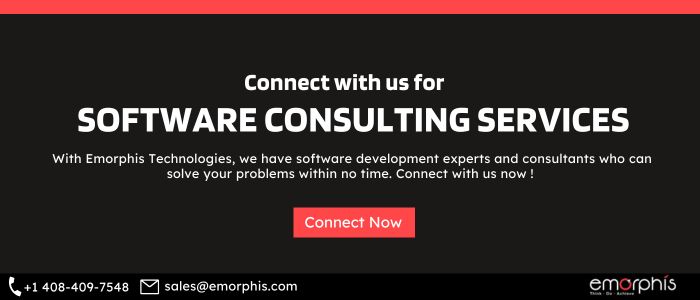
Now that we understand what Emorphis does, let’s explore if you have to choose a health cloud implementation, what details you should know.
Why Health Cloud is Your On-the-Go Solution
Health cloud solutions are designed to make healthcare data accessible anytime and anywhere, which is crucial in today’s fast-paced healthcare environment. By moving patient records, appointments, and clinical workflows to the cloud, healthcare organizations can improve efficiency, collaboration, and patient care.
Some of the key benefits of health cloud solutions include:
- Real-Time Access: Doctors, nurses, and care teams can access patient data instantly from any location.
- Improved Collaboration: Multiple departments can work together seamlessly, sharing critical patient information securely.
- Scalability: Cloud platforms can grow with your organization, handling more data and users without complex upgrades.
- Enhanced Security: Health cloud providers offer built-in security measures to protect sensitive patient information.
- Interoperability: Cloud systems can connect with EHRs, wearable devices, and other healthcare applications for a unified data view.
With these advantages, health cloud implementation ensures that healthcare organizations can respond faster, provide better care, and reduce operational inefficiencies.
Having understood why health clouds are essential, the next step is to look at the different health cloud solutions available in the market and what each one offers.

Health Clouds
1. Salesforce Health Cloud
Salesforce Health Cloud is a powerful platform designed to centralize patient information and improve care coordination. It provides a 360-degree view of patients, allowing doctors, nurses, and care teams to access medical records, treatment history, and patient interactions in real time. With its intuitive interface and patient management tools, providers can streamline communication and improve care planning, which reduces errors and improves patient outcomes.
Beyond care coordination, Salesforce Health Cloud also focuses on patient engagement and analytics. Secure messaging, portals, and appointment management tools help patients stay informed and involved in their own care. Its analytics capabilities support population health initiatives, allowing providers to track trends, monitor patient outcomes, and optimize care programs. Integration with EHRs, wearable devices, and third-party applications ensures that all patient data is unified and actionable.
2. Microsoft Cloud for Healthcare
Microsoft Cloud for Healthcare offers a comprehensive solution for managing patient data and healthcare workflows. Unifying data across departments and systems allows providers to have a clear and consistent view of patient health. One of its strongest features is the support for telehealth and virtual consultations, enabling care delivery regardless of patient location. This capability has become essential in modern healthcare, especially for remote or rural patient populations.
In addition, Microsoft Cloud leverages AI-powered insights to help healthcare providers make better decisions. Predictive analytics can anticipate patient needs, optimize resource allocation, and reduce operational inefficiencies. The platform also emphasizes security and compliance, ensuring that all patient data is HIPAA-compliant. Seamless integration with Microsoft 365, Teams, and Azure services makes it easier for healthcare organizations to adopt without disrupting existing workflows.
3. Google Cloud Healthcare API
Google Cloud Healthcare API is designed to provide scalable infrastructure for storing, managing, and processing healthcare data. Its interoperability with FHIR, HL7, and DICOM standards ensures that different systems can communicate effectively, making it easier for organizations to unify data from multiple sources. This interoperability is critical for enabling efficient care coordination and reducing data silos in healthcare systems.
The platform also includes AI and machine learning capabilities that allow healthcare providers to gain predictive insights and optimize patient care. For example, real-time monitoring of patient vitals or trends in large datasets can help clinicians make proactive decisions. Google Cloud also offers robust security and compliance tools, making it suitable for organizations that need to manage sensitive healthcare information securely while leveraging advanced analytics.
4. Oracle Health Sciences Cloud
Oracle Health Sciences Cloud is focused on life sciences and clinical research, offering specialized tools for managing clinical trials, regulatory data, and patient information. The platform provides comprehensive data management and analytics capabilities, allowing research teams to analyze trends, assess outcomes, and optimize clinical programs. Its infrastructure ensures that healthcare organizations can manage large datasets efficiently without compromising security.
Oracle Health Sciences Cloud also emphasizes integration and compliance. It seamlessly connects with existing enterprise systems and healthcare applications, allowing organizations to centralize data and maintain regulatory standards globally. By providing visualization tools and real-time reporting, it enables healthcare and research teams to make informed decisions quickly, improving both operational efficiency and research outcomes.
5. IBM Watson Health Cloud
IBM Watson Health Cloud is a platform built for AI-driven healthcare insights and population health management. It integrates data from multiple sources, including EHRs, labs, and medical devices, to provide a comprehensive view of patient health. Its AI-powered decision support tools help clinicians identify trends, predict outcomes, and make data-driven treatment decisions, improving overall patient care.
In addition, Watson Health Cloud emphasizes security, compliance, and operational efficiency. Its tools ensure that healthcare organizations can meet regulatory requirements while optimizing workflows. With features for patient engagement, predictive analytics, and research support, Watson Health Cloud is particularly suitable for hospitals, research institutions, and large healthcare networks seeking to leverage advanced technologies for better outcomes.
With a clear understanding of each health cloud platform, it becomes easier to compare its features and capabilities. The next section will present a comparison table to help healthcare organizations select the most suitable cloud solution for their needs.
Comparison Table of Health Clouds
To help healthcare organizations choose the right platform, here’s a detailed comparison of the major health cloud solutions based on key features, strengths, and ideal use cases:
| Feature / Platform | Salesforce Health Cloud | Microsoft Cloud for Healthcare | Google Cloud Healthcare API | Oracle Health Sciences Cloud | IBM Watson Health Cloud |
|---|---|---|---|---|---|
| Primary Focus | Patient engagement and care coordination | Unified patient data and telehealth | Scalable data management and interoperability | Life sciences, clinical trials, research | AI-powered analytics and population health |
| Data Integration | EHRs, wearables, third-party apps | Microsoft 365, Teams, Azure, EHRs | FHIR, HL7, DICOM standards | Enterprise systems and healthcare apps | EHRs, labs, medical devices |
| Analytics & AI | Population health insights | Predictive analytics for care optimization | Predictive insights using AI/ML | Research analytics and visualization | AI-driven clinical decision support |
| Patient Engagement | Secure messaging, portals, and appointment management | Virtual consultations, telehealth | Limited patient-facing tools | Research focus, limited patient engagement | Population health management tools |
| Security & Compliance | HIPAA-compliant | HIPAA-compliant, enterprise-grade security | Built-in security and compliance tools | Global regulatory compliance | HIPAA-compliant, regulatory focus |
| Scalability | Medium to large healthcare organizations | Medium to large organizations | Highly scalable, cloud-native | Large research and healthcare networks | Large hospitals and research institutions |
| Best For | Care coordination, patient engagement | Telehealth, unified patient management | Data interoperability, predictive analytics | Clinical research, regulatory-compliant studies | AI-driven insights, population health |
Key Takeaways from the Table
- Salesforce Health Cloud is ideal for organizations focusing on patient engagement and care team coordination.
- Microsoft Cloud for Healthcare excels in telehealth and integrated workflow management.
- Google Cloud Healthcare API provides a scalable data infrastructure and AI-driven predictive analytics.
- Oracle Health Sciences Cloud is best suited for clinical research and life sciences applications.
- IBM Watson Health Cloud is focused on advanced AI analytics and population health management.
Now that we have a clear comparison, the next step is to understand how Emorphis, a healthcare IT consulting firm, can help in health cloud implementation effectively.
How Emorphis Can Help Implement Each Health Cloud
Emorphis, as a healthcare IT consulting firm, provides end-to-end services to help healthcare organizations adopt and implement the right health cloud platform for their needs. The approach is structured, ensuring minimal disruption to existing operations and maximum benefits from cloud adoption.
For Salesforce Health Cloud
Emorphis helps integrate existing patient records, appointment systems, and care coordination workflows. They configure secure portals and messaging tools for patients while setting up analytics dashboards for population health insights. By customizing the platform according to the organization’s specific workflows, Emorphis ensures better care coordination and patient engagement.
When implementing Microsoft Cloud for Healthcare
Emorphis assists in setting up telehealth platforms and integrating virtual consultation tools. They also help organizations leverage AI-driven predictive analytics to optimize patient care. Data from existing EHRs, Teams, and Azure services are seamlessly unified to provide a single source of truth for patient information.
For Google Cloud Healthcare API
Emorphis focuses on scalable infrastructure, data migration, and interoperability. They ensure that data from multiple sources, like EHRs, imaging systems, and wearables, can communicate effectively using FHIR, HL7, and DICOM standards. Additionally, Emorphis helps deploy AI and machine learning models for predictive insights, enabling proactive care management.
With Oracle Health Sciences Cloud
Emorphis guides organizations through clinical research and data management workflows. They ensure compliance with regulatory standards while integrating data from clinical trials, EHRs, and real-world evidence. The firm also configures analytics and visualization tools to help research and operations teams make data-driven decisions efficiently.
For IBM Watson Health Cloud
Emorphis supports AI-powered clinical decision support and population health management initiatives. They integrate multiple data sources, configure predictive models, and provide training to care teams. Their goal is to help organizations leverage AI insights for better patient outcomes while maintaining strict data security and compliance.
After understanding how Emorphis implements these health cloud platforms, the next section highlights the advantages of choosing Emorphis as your healthcare IT consulting firm.
Reach out today, a brief conversation can clarify all your health cloud questions. Get in touch now!

Advantages of Choosing Emorphis, a Healthcare IT Consulting Firm
Partnering with Emorphis offers numerous advantages for healthcare organizations looking for a health cloud implementation. As a specialized healthcare IT consulting firm, Emorphis combines technical expertise with industry knowledge to deliver solutions that are secure, scalable, and fully compliant.
One of the primary advantages is the customization of the health cloud implementation. Accessing an organization’s current IT infrastructure, workflows, and patient care processes helps to recommend the most suitable platform for health cloud implementation. This tailored approach ensures that the solution aligns with both clinical and administrative needs.
Another key benefit is end-to-end support. From cloud readiness assessment to system integration, data migration, staff training, and post-deployment support, Emorphis ensures a smooth transition to the cloud. This health cloud implementation process reduces operational risks, minimizes downtime, and improves overall efficiency.
More
Emorphis also emphasizes regulatory compliance and data security. Ensuring that all health cloud implementations meet HIPAA standards and other relevant healthcare regulations is one of the priorities. The expertise in secure cloud integration gives healthcare organizations confidence that sensitive patient information is protected while still accessible to authorized personnel.
Emorphis helps organizations maximize ROI and improve patient outcomes. By streamlining workflows, enabling real-time access to patient data, and leveraging advanced analytics, healthcare providers can make better decisions faster, enhance patient engagement, and improve care quality.
Finally, let’s check the details on pricing. Health cloud implementation pricing is tailored to your organization’s specific needs, considering factors like project complexity, platform choice, integrations, and timeline.
For a clear understanding of the options and detailed pricing, connect with our experts today and explore a solution that fits your requirements.
Find the case study on the Implementation of Salesforce Health Cloud
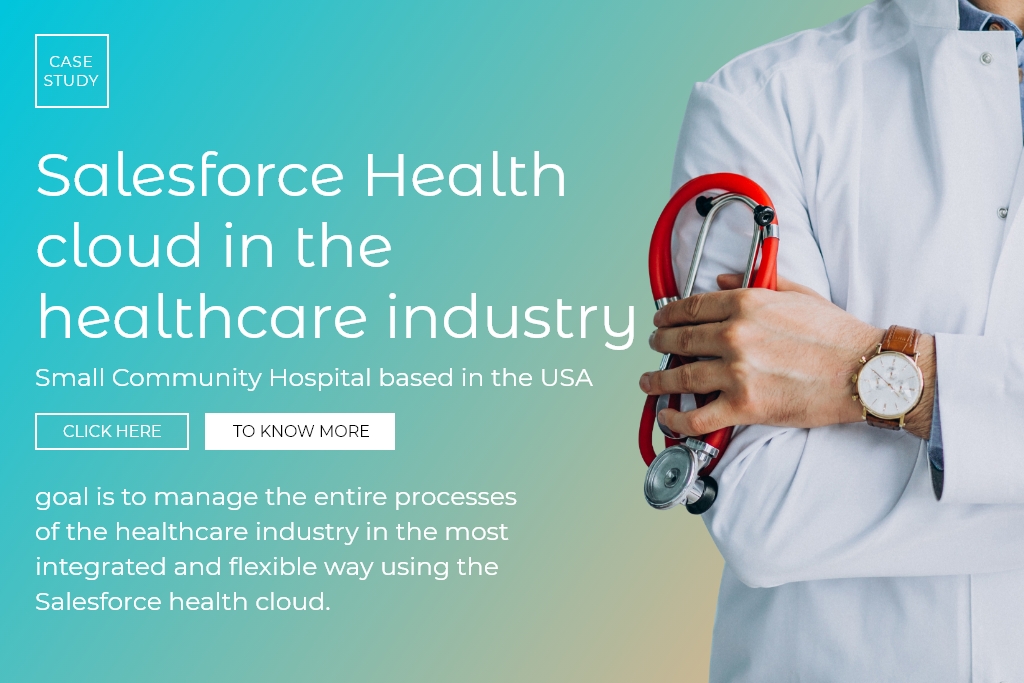
With these advantages in mind, it’s important to also consider future trends in health cloud solutions to ensure your organization stays ahead of technological developments.
Future Trends in Health Cloud Solutions
The healthcare industry is constantly evolving, and solutions for health cloud implementation are no exception. To stay ahead, organizations need to be aware of emerging trends that are shaping the future of patient care and healthcare IT.
One key trend is AI-driven analytics and predictive insights. Health clouds are increasingly integrating artificial intelligence to help providers anticipate patient needs, identify potential health risks early, and optimize care delivery. Predictive models can analyze large datasets from EHRs, wearable devices, and other sources to support proactive and personalized treatment plans.
Another important trend is IoT and remote patient monitoring. Connected medical devices and wearables generate real-time health data that can be analyzed in the cloud. This allows healthcare providers to monitor patients outside the hospital, improve chronic disease management, and reduce readmission rates. Integrating IoT with health cloud implementation ensures timely intervention and better patient outcomes.
Telehealth and virtual care will continue to expand, powered by cloud technologies that enable secure video consultations, appointment management, and patient engagement tools. These solutions help organizations reach remote or underserved populations while maintaining compliance and data security.
Lastly, enhanced interoperability and cloud integration will remain critical. As healthcare organizations adopt multiple systems, the ability to unify data from different sources, including EHRs, labs, and third-party applications, will drive efficiency, reduce errors, and improve decision-making.

Conclusion
Partnering with Emorphis, a healthcare IT consulting firm, allows healthcare organizations to choose an effective solution, platform, and health cloud implementation that enhances patient care, improves operational efficiency, and ensures regulatory compliance. From assessing your IT readiness to integrating legacy platforms and providing ongoing support, Emorphis offers a comprehensive approach that minimizes risks and maximizes results.
By leveraging platforms like Salesforce Health Cloud, Microsoft Cloud for Healthcare, Google Cloud Healthcare API, Oracle Health Sciences Cloud, and IBM Watson Health Cloud, healthcare providers can access real-time patient data, coordinate care more effectively, and make data-driven decisions. Dont forget to also check out EHR aggregators vs Custom Integration.
With Emorphis’ expertise, organizations can implement, integrate, and operate these solutions seamlessly, unlock advanced analytics, and stay ahead of emerging trends like AI-driven insights and remote patient monitoring.
If your organization is looking to streamline healthcare operations, improve patient engagement, and adopt the latest cloud technologies, partnering with Emorphis is the right choice. Contact us today to explore how your healthcare organization can benefit from tailored health cloud implementation and transform patient care for the future.
You can also check details on our Software Consulting Services and Cloud Computing Services.
Frequently Asked Questions
1. What is a healthcare IT consulting firm?
A healthcare IT consulting firm like Emorphis provides expertise in implementing healthcare technology solutions, including health cloud platforms, system integration, data management, and regulatory compliance support.
2. Why should my healthcare organization adopt a health cloud?
Health cloud solutions enable real-time access to patient data, improve care coordination, enhance security, and support analytics for better clinical decision-making and patient engagement.
3. Which health cloud platforms are commonly used?
Popular health cloud platforms include Salesforce Health Cloud, Microsoft Cloud for Healthcare, Google Cloud Healthcare API, Oracle Health Sciences Cloud, and IBM Watson Health Cloud, each serving different healthcare needs.
4. How can Emorphis help implement health cloud solutions?
Emorphis provides end-to-end support including cloud readiness assessment, system integration, data migration, customization, staff training, and ongoing support for seamless implementation.
5. What are the advantages of choosing Emorphis?
Emorphis offers tailored cloud solutions, regulatory compliance expertise, advanced analytics integration, and long-term support, helping healthcare organizations maximize ROI and improve patient outcomes.
6. How does health cloud improve patient engagement?
Health cloud platforms enable secure patient portals, appointment management, messaging, and telehealth, keeping patients informed and engaged in their care journey.
7. Can health clouds integrate with existing healthcare systems?
Yes, modern health clouds support interoperability standards like FHIR, HL7, and DICOM, allowing integration with EHRs, labs, wearables, and other clinical systems.
8. What future trends should healthcare organizations watch?
Emerging trends include AI-driven analytics, predictive insights, IoT-enabled remote monitoring, telehealth expansion, and enhanced interoperability to improve care and efficiency.
9. Is health cloud implementation secure and compliant?
Yes, reputable platforms like Salesforce, Microsoft, Google, Oracle, and IBM provide HIPAA-compliant security and Emorphis ensures regulatory adherence during implementation.
10. How can I get started with Emorphis for health cloud implementation?
Contact Emorphis to discuss your healthcare organization’s requirements. They will assess your needs, recommend the best cloud platform, and guide you through end-to-end implementation.



